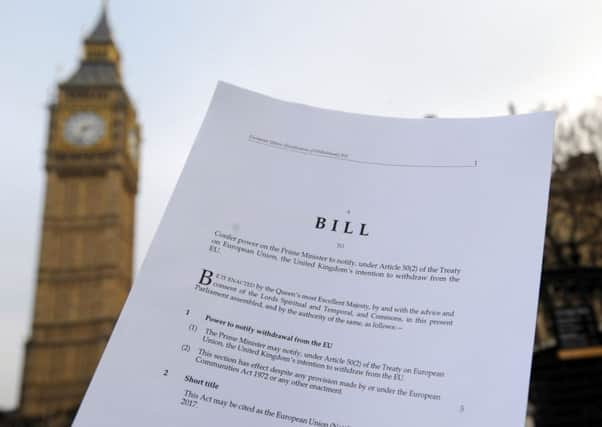Lords face fresh warnings over plans to amend Brexit legislation


Theresa May took the unusual step of sitting in the second chamber to watch proceedings today, as peers began the first of up to five days of scrutiny and debate of the Government’s Brexit Bill.
Opposition and cross-bench members have tabled more than a dozen amendments to the legislation, with the future rights of EU citizens and a “meaningful vote” on the final deal chief among their concerns.
Advertisement
Hide AdAdvertisement
Hide AdBut they face mounting pressure to allow the Bill to pass through unchanged, with Mrs May adding her voice to calls for peers to respect the outcome of the referendum and allow the Government to get on with negotiations.
Opening the debate, the Conservative leader in the Lords, Baroness Evans, stressed that the Bill is not about re-visiting the debate on whether Britain should leave the EU, but about the legal means of giving Mrs May the power to begin withdrawal negotiations “and nothing more”.
She argued that the Government has been given a “strong mandate” to trigger Article 50 by the people and by elected MPs, and urged peers to “respect” their decision.
“This Bill is not the place to try and shape the terms of our exit, restrict the Government’s hand before in enters into complex negotiations or attempt to re-run the referendum,” she said.
Advertisement
Hide AdAdvertisement
Hide Ad“I am confident peers will take a constructive approach in our deliberations.”
As she spoke, Baroness Evans was watched by the Prime Minister, who had made rare use of her right as a member of the Privy Council to view proceedings from the steps of the Royal Throne.
Earlier in the day, during a visit to support the Conservative candidate in the Stoke by-election, Mrs May had sent her own veiled warning to peers as she told reporters she “doesn’t want to see anyone holding up what the British people want”.
A similar warning was issued by the former Foreign Secretary Lord Hague, who condemned recent calls for a new cross-party movement to reverse the outcome of the referendum as a “great mistake”.
Advertisement
Hide AdAdvertisement
Hide AdHe told fellow peers this had the potential to lead to the most “bitter, potentially endless conflict” seen in British society for “decades”.
However, the Lib Dem leader in the Lords, Lord Newby, was highly critical of suggestions that attempts to amend the Bill were in any way equivalent to “blocking” it.
He argued peers have “the power to ask the Commons to think again on any piece of legislation” and it would be “unthinkable and unconscionable” to let the current Bill pass unchallenged.
“Brexit is the most important single issue which has faced the country for decades,” he said. “For many of us the approach being adopted by the Government is little short of disastrous.”
Advertisement
Hide AdAdvertisement
Hide AdMeanwhile, the Labour peer Lord Mandelson argued that claims the UK would enjoy the same trade benefits after breaking with Brussels amounted to “a fraud on the public”.
He also claimed the Government had “lost its sense of perspective” on Brexit, with its focus on “assuaging the ideologues” rather than trade, investment and jobs.
And the Tory former chancellor Lord Lawson of Blaby was jeered by his fellow peers, when he suggested all of the amendments that have been tabled so far were “ill-advised” and “improper”.
He went on to state that the notion of a free trade deal with the EU with no strings attached was “unattainable” and the Government should “waste no time banging their heads against a brick wall” to get one
Advertisement
Hide AdAdvertisement
Hide AdThere will be a second day of debate to complete the second reading of the Bill tomorrow, followed by committee stage and votes on amendments next week.
While the Conservatives have the largest number of peers at 252, they could be outvoted by an alliance of Labour’s 202 peers and the Lib Dems’ 102.